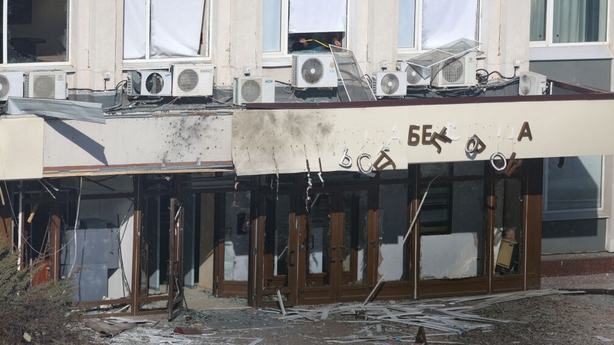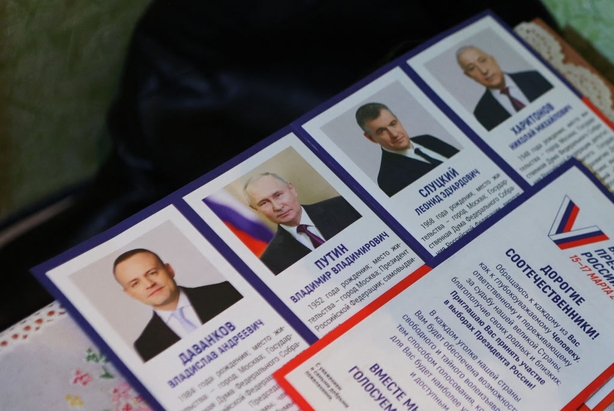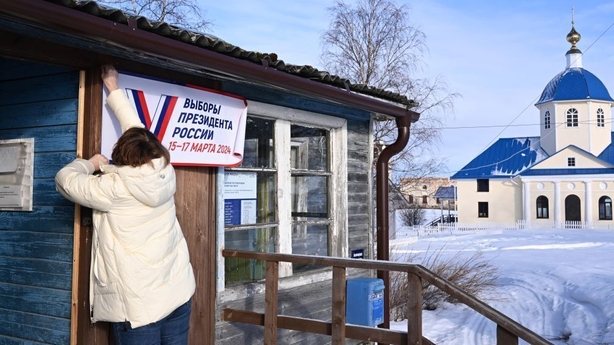US President Joe Biden has ordered $300 million in urgent military aid for Ukraine as Congress continues to block a much larger package of assistance, the White House said on Tuesday.
"Today, on behalf of President Biden, I'm announcing an emergency package of security assistance and $300 million worth of weapons and equipment to address some of Ukraine's pressing needs," National Security Advisor Jake Sullivan told reporters.
It is the first such move in months as additional funds for Kyiv remain blocked by Republican leaders in Congress.
Officials said that the funding for this package is from credits refunded to the Pentagon for recent purchases.
The US Army, in particular, has been making huge purchases of munitions and vehicles to replenish stocks sent to Ukraine.
The last drawdown was in December 2023 when funds to replenish stocks fell to zero.
Using the funds that have been returned to replenish stocks opens a narrow window to urgently allow more aid to be sent from existing stocks as the Biden administration waits for supplemental funding to be passed by lawmakers.
US President Joe Biden has backed military aid to Ukraine since Russia's full-scale invasion in 2022, while his likely Republican opponent in the 5 November election, former president Donald Trump, has a more isolationist stance.
Republican House of Representatives Speaker Mike Johnson, an ally of Trump, has so far refused to call a vote on a bill that would provide $60 billion more for Ukraine.
The measure has passed the Democratic-run Senate, and both Republicans and Democrats in the House say it would pass if the chamber's Republican leaders allowed a vote.
Leaders of US intelligence agencies urgently pressed members of the House of Representatives on Tuesday to approve additional military assistance for Ukraine, saying it would not only boost Kyiv as it fights Russia but discourage Chinese aggression.
Ukraine improves 'strategic position'
President Volodymyr Zelensky said on Monday that the situation along the front of the country's war with Russia was the best in three months, with Moscow's troops no longer advancing after their capture last month of the eastern city of Avdiivka.
Mr Zelensky, in an interview with France's BFM television, said Ukraine had improved its strategic position despite shortages of weaponry, but suggested the situation could change again if new supplies were not forthcoming.
He said earlier that Russia is preparing a new offensive against Ukraine starting in late May or summer. Mr Zelensky has said 31,000 Ukrainian soldiers have been killed since February 2022.
Russia's capture of Avdiivka gave the Kremlin's forces breathing room in defending the Russian-held regional centre of Donetsk, 20 kilometres to the east.
Earlier this month, a top military commander said that Ukrainian troops were forced to leave several settlements neighboring Avdiivka due to Russia's continued offensive amid its own depleting stockpiles of munitions.
Denmark will provide a new military aid package including Caesar artillery systems and ammunition to Ukraine worth around 2.3 billion Danish crowns ($336.6 million), the Danish Defence Ministry said in a statement on Tuesday.
European Union countries are set to agree on a new €5 billion top-up to a fund used to finance military shipments to Ukraine, the Financial Times reported on Tuesday, citing four officials briefed on the discussions.

Anti-Kremlin fighters attack Russia from Ukraine
Armed fighters purporting to be Russian citizens who oppose the Kremlin have said they carried out cross-border incursions into western Russia from Ukraine overnight using tanks, but Moscow said it had repelled the attacks.
Ukraine said the groups were acting independently.
However, the border raids, carried out days before a presidential election in Russia and just over two years after Moscow's full-scale invasion of its neighbour, are widely seen as backed by Kyiv.
"This is only the first day (of the operation). But the elections, as we know, are only at the end of the week ... All the most interesting things are yet to come," said Alexei Baranovsky, a spokesperson for the Freedom of Russia Legion.
The group said it had taken full control of Tyotkino, a village on the edge of Russia's Kursk region bordering Ukraine, and aired aerial footage, apparently shot by a drone, showing several soldiers running across a field.
Mr Baranovsky said the bulk of the forces used in the operation were in the Kursk region.
The attack, he added, could force Russia to pull in reserves to defend the area, relieving Russian offensive pressure on Ukrainian troops in eastern Ukraine.
"We are distracting the reserves, the attention of the Russian army. They are forced to transfer reserves.. this is also our contribution to the defence of Ukraine," he said.
The group said it had destroyed a Russian armoured personnel carrier and that the border incursions had been undertaken alongside two other Ukraine-based groups - the Russian Volunteer Corps and the Siberian Battalion.
Russia's TASS news agency cited the local governor as saying one person had been wounded by Ukrainian shelling in Tyotkino.
The Russian defence ministry said it had beaten back the attackers and forced them to retreat.
It said Ukrainian "terrorist formations" backed by tanks and armoured combat vehicles tried to invade in three separate directions in Russia's Belgorod region, which borders the Kursk region and Ukraine, at about 3am (12am Irish time).
It said four more attacks by Ukrainian "sabotage and reconnaissance groups" were repelled around five hours later in the Kursk region.
The Belgorod and Kursk areas were also hit by Ukrainian drones and a drone crashed into the Belgorod city administration building, injuring two people, the regional governor said.

A spokesperson for Ukraine's military intelligence agency said the groups were acting independently of Ukraine.
However, Kyiv has never made clear how such groups have received advanced weapons and armoured vehicles.
The Freedom of Russia legion and Russian Volunteer Corps said they were behind other cross-border raids.
Russian officials cast the groups as puppets of Ukraine's military and the US Central Intelligence Agency.

Two of the units alluded to Russia's presidential election this week in social media posts.
The Siberian Battalion posted a video which it said was an address to the Russian people from its fighters in the country. In the footage, a masked man in military uniform urged Russians to fight rather than vote.
"Guys, don't vote with ballots, vote with calibers (of guns)," he said.
The Freedom of Russia Legion's post also appeared to refer to the election, in which President Vladimir Putin is certain to win a fifth term.
"The people will vote for whom they want, not for whom they have to. Russians will live freely," the legion said.
Ukraine says it broke up pro-Kremlin 'informational sabotage' network
Ukrainian Security Service said on Tuesday it has uncovered one of the largest networks in the country allegedly spreading pro-Russian "informational sabotage", coordinated by a cleric of the minority Moscow-linked church.
Kyiv officials said Moscow planned to step up its informational war this spring, spreading disinformation in an attempt to divide Ukrainian society.
The SBU agency said it has exposed 15 members of the network linked to Russia's Federal Security Service (FSB), detaining four of them, including the cleric of a Kyiv-based temple of the minority Ukrainian Orthodox Church (UOC).
"It is one of the largest FSB networks that has been operating in Ukraine since the beginning of the full-scale invasion," SBU said on its Telegram channel.
The group was involved in spreading pro-Kremlin narratives aimed at destabilising society and inciting religious hatred, according to the agency. Ukrainian authorities and part of society had for years seen the UOC as loyal to Moscow.
In 2023, the parliament backed a ban on its activities in the initial vote.
The church describes itself as independent, saying it cut ties with the Russian Orthodox Church, which supports Moscow's war in Ukraine. A government commission has ruled that the church is still canonically linked to Russia.

